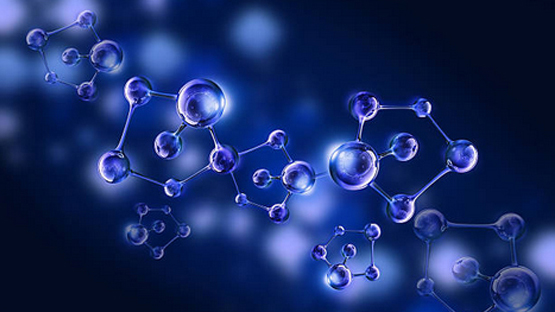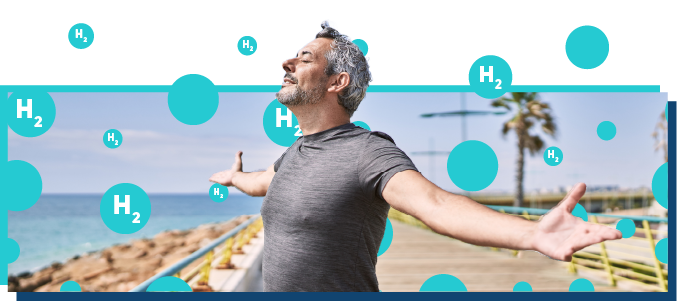In today’s fast-paced world, we are constantly exposed to various environmental stressors, unhealthy diets, and pollution, all of which can increase the risk of oxidative damage in our bodies. Antioxidants have become buzzwords in the health and wellness world for their role in protecting our cells from damage. But why exactly do we need antioxidants, and how can something as simple as hydrogen gas (H2) act as an antioxidant to benefit our health?
What Are Antioxidants?

Antioxidants are molecules that help protect our cells from oxidative stress, which is caused by an imbalance between free radicals (unstable molecules that can damage cells) and our body’s ability to counteract their harmful effects. Free radicals are produced naturally in the body through normal metabolic processes, but their levels can increase due to external factors such as pollution, smoking, poor diet, and UV exposure.
When free radicals accumulate, they can lead to oxidative stress, damaging cells, proteins, and DNA. This damage is associated with aging and various diseases, including cancer, cardiovascular disease, and neurodegenerative conditions like Alzheimer’s disease.
Antioxidants neutralize free radicals by donating electrons without becoming unstable themselves, thereby preventing further cellular damage. Our body produces some antioxidants naturally, but we also need to obtain additional antioxidants from our diet (e.g., vitamins C and E, selenium, and polyphenols) to maintain optimal health.
Why Our Bodies Need Antioxidants
- Cell Protection: Antioxidants act as shields for our cells, helping to prevent damage caused by oxidative stress. By neutralizing free radicals, they can slow down cell damage and reduce the risk of chronic diseases.
- Supports Immune Function: A healthy immune system relies on antioxidants to function properly. Oxidative stress can weaken immune cells, making the body more susceptible to infections and illnesses. Antioxidants help maintain the integrity of immune cells and enhance the body’s defense mechanisms.
- Delays Aging: One of the most well-known benefits of antioxidants is their potential to slow the aging process. By reducing oxidative damage to cells, antioxidants can help reduce the appearance of wrinkles, fine lines, and other signs of aging, while also supporting the health of vital organs.
- Reduces Inflammation: Chronic inflammation is a major contributor to many diseases, including heart disease and arthritis. Antioxidants can help reduce inflammation by neutralizing the free radicals that contribute to inflammatory responses in the body.
Hydrogen Gas as an Antioxidant

Hydrogen (H2) gas is a colorless, odorless molecule that has recently gained attention in the scientific community for its antioxidant properties. Though it might seem surprising that such a simple molecule could act as a powerful antioxidant, hydrogen gas has demonstrated a unique ability to protect cells from oxidative stress and inflammation.
Here’s how hydrogen gas functions as an antioxidant:
- Selective Scavenger of Harmful Free Radicals: Unlike other antioxidants that neutralize all free radicals, hydrogen gas selectively targets the most harmful ones—such as hydroxyl radicals (OH•)—while leaving beneficial free radicals intact. Hydroxyl radicals are among the most reactive and damaging free radicals, responsible for much of the oxidative damage in the body. By focusing on these specific free radicals, hydrogen gas protects cells from significant oxidative damage.
- Reduces Oxidative Stress Without Disrupting Normal Cellular Functions: Since hydrogen gas is small and neutral, it can easily penetrate cell membranes and tissues, including the blood-brain barrier, to reach areas of the body where oxidative stress is occurring. Its selective action ensures that hydrogen gas doesn’t interfere with the body’s natural cellular processes or the beneficial reactive oxygen species (ROS) that serve important signaling functions in the body.
- Anti-Inflammatory and Cytoprotective Properties: Studies have shown that hydrogen gas has anti-inflammatory effects, reducing the release of pro-inflammatory molecules and helping to alleviate conditions such as arthritis, heart disease, and neurodegenerative diseases. Its cytoprotective effects also help prevent cell death in tissues affected by oxidative stress, which can have implications for organ protection during injury or disease.
- Safe and Easy to Use: One of the advantages of hydrogen gas therapy is its safety. Hydrogen is a naturally occurring molecule in the body, produced in small amounts during digestion. As an antioxidant, it can be administered in various forms, including inhaling hydrogen gas, drinking hydrogen-rich water, or receiving hydrogen-infused saline solutions. This versatility makes hydrogen therapy accessible and non-toxic.
The Future of Hydrogen Gas in Health
Clinical studies have shown that hydrogen gas can help improve conditions like metabolic syndrome, reduce the side effects of cancer treatments, and protect against neurological diseases such as Parkinson’s and Alzheimer’s.
As more research is comes to light, hydrogen gas has become a valuable tool in the fight against oxidative stress and inflammation, offering a simple, safe, and effective way to boost the body’s natural antioxidant defenses.
Conclusion
Our bodies need antioxidants to combat the damaging effects of free radicals and oxidative stress, which are linked to aging and many chronic diseases. While traditional antioxidants like vitamins C and E are well-known for their health benefits, hydrogen gas is an emerging player in the world of antioxidants. Its unique ability to selectively target harmful free radicals, reduce inflammation, and protect cells from damage makes it a promising candidate for future therapies. As we continue to see the therapeutic benefits of hydrogen gas, it has become a go-to solution for supporting overall health and wellness.














